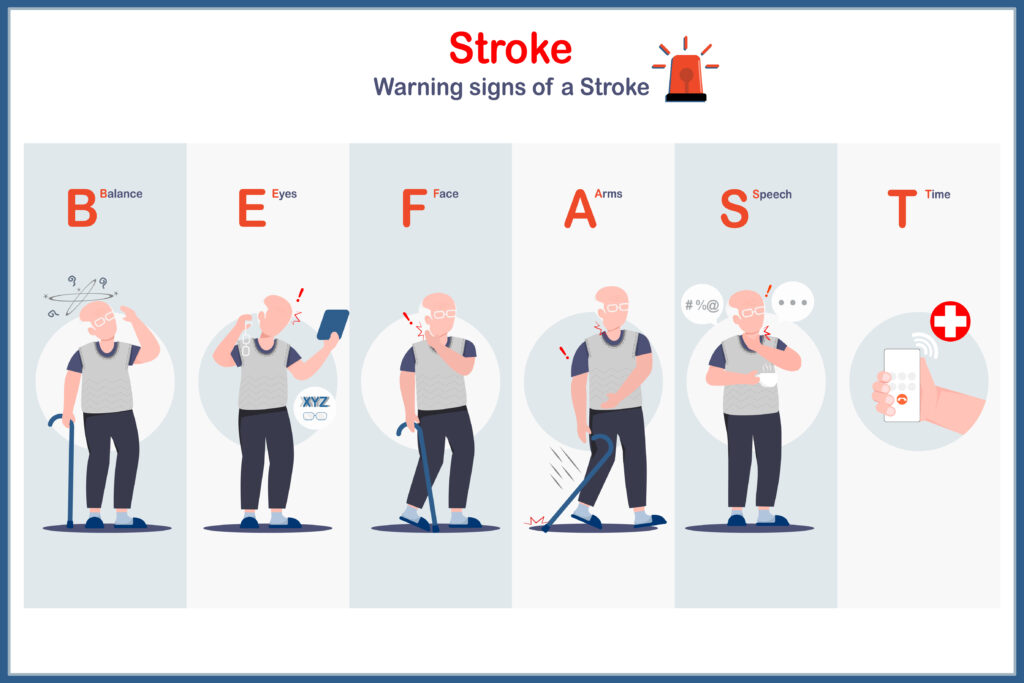
Every 40 seconds, someone in the U.S. suffers from a stroke, giving the American Stroke Association good reason to declare May as American Stroke Month. From helping you recognize stroke risk factors and warning signs to supporting your family through stroke recovery, the Traditions Health team is ready to go all in to raise awareness.
What are strokes?
A stroke happens when something blocks the blood supply to part of your brain or when a blood vessel in your brain bursts. When it happens, parts of your brain can be permanently damaged. And because the brain controls bodily functions like movement and language, a stroke can impact your ability to walk and communicate.
What are the risk factors of strokes?
According to the Centers for Disease Control and Prevention (CDC), the risk factors for a stroke include:
Common medical conditions, such as:
- A previous stroke
- Diabetes
- Heart disease
- High blood pressure
- High cholesterol
- Obesity
- Sickle cell disease
Certain lifestyle behaviors, such as:
- Excessive alcohol consumption
- Eating a diet high in fat and sodium
- Not getting enough physical activity
- Smoking
Other factors, such as:
- Family history
- Gender, with women more likely to have a stroke than men
- Older age
- Race or ethnicity, with people who are Black and Pacific Islanders at a higher risk
What are the warning signs of a stroke?
Symptoms of a stroke include:
- Sudden confusion, trouble speaking, or difficulty understanding speech
- Sudden numbness or weakness in the face, arm, or leg, especially on one side of the body
- Sudden severe headache without a known cause
- Sudden trouble seeing in one or both eyes
- Sudden trouble walking, dizziness, loss of balance, or lack of coordination
How to act fast during a stroke
During a stroke, every minute counts. That means fast action can lessen how much a stroke damages the brain.
The American Stroke Association developed “F.A.S.T.” to help you know when someone may be experiencing a stroke and what to do. Since then, Intermountain Healthcare created an adaptation of the “F.A.S.T”, model called “B.E.F.A.S.T.”

B. E. F.A.S.T. stands for:
- B = Balance – Is the person suddenly having trouble with balance or coordination?
- E = Eyes – Is the person experiencing sudden blurred or double vision or a sudden loss of vision in one or both eyes?
- F = Face Drooping – Does one side of the face droop, or is it numb? Ask the person to smile. Is the person’s smile uneven?
- A = Arm Weakness – Is one arm weak or numb? Ask the person to raise both arms. Does one arm drift downward?
- S = Speech Difficulty – Is speech slurred?
- T = Time to call 911
Home health care for stroke patients
A leading cause of disability in the United States, stroke can cause lingering health problems, like issues with speech, memory loss, and limb weakness. Although some of these symptoms may go away with time, others may require ongoing assistance.
For example, some stroke survivors may need support as they work to regain their independence or perform rehabilitation exercises.
That’s where home health care can help. If you or a loved one is recovering from a stroke, a skilled home health agency can come to your home and provide professional medical care, with services such as:
- Home health aide, including help with activities of daily living
- Medication management
- Occupational therapy
- Physical therapy
- Skilled nursing
- Social work
- Speech therapy
Many patients and their loved ones feel more comfortable receiving services like these at home, with healthcare providers they trust.
Request home health care from Traditions Health
The Traditions Health home health care team can help your loved one with their quality of life. Complete a request care form online or call a Traditions Health location near you to learn more.